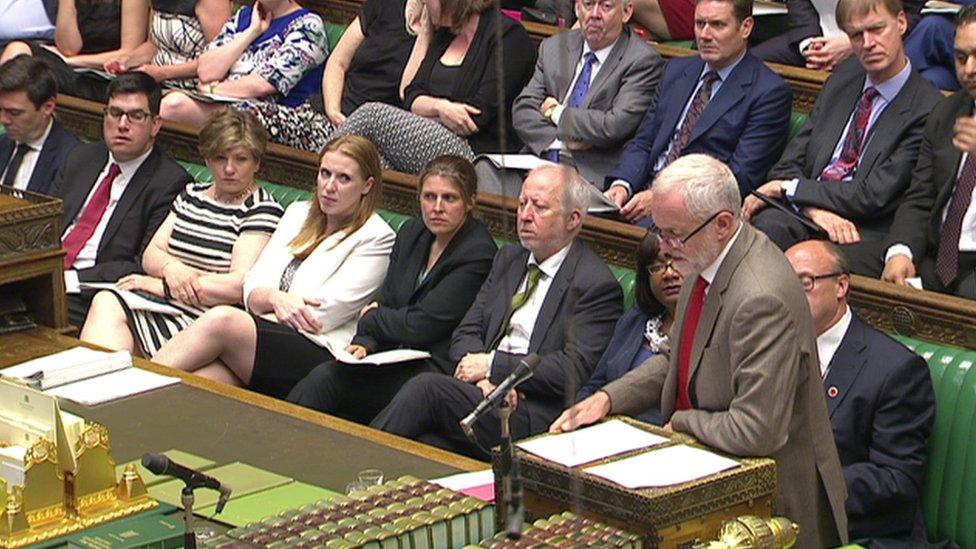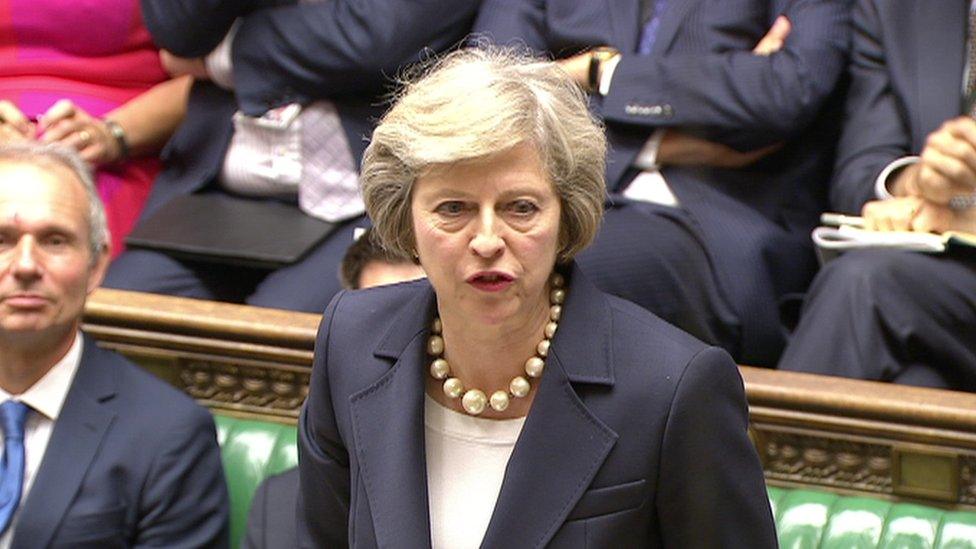Theresa May attacks 'unscrupulous boss' Corbyn at PMQs
- Published
Jeremy Corbyn questions Theresa May on jobs and she points to problems in his party
Theresa May likened Jeremy Corbyn to an "unscrupulous boss" as she made her Prime Minister's Questions debut.
As the two leaders clashed on workers' rights, Mrs May suggested Labour frontbenchers had to "double their workload" while Mr Corbyn "exploits the rules to further his own career".
Mr Corbyn said Tories might find economic insecurity "funny" but millions of people did not.
The Labour leader said the government's economic plan had "failed".
"Is there another one?" he asked.
Mr Corbyn said austerity meant people "being poorer" and "jobs being cut", prompting Mrs May to respond: "He calls it austerity. I call it living within our means."
Opening exchanges
As is customary, Mrs May set out her meetings for the day, including talks with German Chancellor Angela Merkel. Her first ever PMQ came from Conservative MP John Glen about Monday night's Trident nuclear vote.
Next up was the Labour leader, who welcomed her and said he hoped they could "debate seriously the future of our country and its place in the world".
His early questions focused on housing, and the two leaders clashed on the lack of affordable homes.
Theresa May versus Jeremy Corbyn

Jeremy Corbyn questioned the appointment of Boris Johnson as foreign secretary
Once the niceties were out of the way, the new PM included a number of barbs at the Labour leader during her first PMQs session, saying the Opposition would spend the summer "tearing itself apart" with a leadership contest while the government would be "bringing this country back together".
Mr Corbyn quizzed her on new Foreign Secretary Boris Johnson's previous comments about US President Barack Obama and his use in the past of the term "piccaninnies", a derogatory word for black children.
And he questioned her pledge to stand up for people in insecure jobs, pointing to planned trade union curbs and the use of so-called zero-hours contracts.
Mrs May said it was important to help those "struggling to make ends meet", going on to attack Labour's infighting.
She said "I suspect there are many members on the Opposition benches who might be familiar with an unscrupulous boss; a boss who doesn't listen to his workers; a boss who requires some of his workers to double their workload; and maybe even a boss who exploits the rules to further his own career."
Leaning forward and fixing Mr Corbyn with a direct stare, she added: "Remind him of anybody?"
What the pundits said

"It was as confident as David Cameron in his early days as prime minister... there were one or two notes that echoed of Margaret Thatcher back in the day - she was much more fluent than Margaret Thatcher was at the beginning of her premiership." John Pienaar, BBC deputy political correspondent
"To me that performance showed we have picked the right person." Conservative MP and Daily Politics guest Gavin Barwell
"Theresa May's style was actually quite refreshing, a move away from 'Flashman Cameron'." Labour MP and Daily Politics guest Cat Smith
"She was chosen as Tory leader primarily for her competence and today it was on display. But she was not selected for her comedy skills, and that made her Thatcher moment rather odd." Andrew Sparrow, The Guardian, external
"This was Maggie May. No wonder the Tory MPs were delighted at this competent debut and the Labour ones despondent. The Labour leader ploughs a worthy field but he must find a better way of presenting his case." Jason Beattie, Daily Mirror, external
"So much for safe, sensible Mrs May. More like 'the bruiser from No 10'", Norman Smith, BBC assistant political editor
Brexit and migration
Theresa May and Philip Davies on cutting migration figures when the UK leaves the EU.
Mrs May faced several questions about the UK's vote to leave the EU. Conservative MP Sir Edward Leigh asked her to be prepared to reject the EU single market when it comes to talks on the UK's exit - she declined to offer such a commitment.
The PM also told Eurosceptic Philip Davies the Brexit vote "sent a very clear message about immigration" which was that people wanted control over EU free movement.
She reaffirmed her commitment to hitting the government's target of bringing net migration down below 100,000, admitting it would "take some time to get there".
SNP Westminster leader Angus Robertson adapted the PM's "Brexit means Brexit" assurance by insisting that "remain means remain" in Scotland.
He asked how Scotland, which voted overall to stay in the EU, could do so if the rest of the UK leaves.
Mrs May said the union was "very important" and promised to "engage fully" with the devolved administrations.
And finally...
PMQs: Tim Farron and Theresa May on losing but going on to lead their parties.
Liberal Democrat leader Tim Farron put the last question to Theresa May, reminding her of the time the two of them stood as candidates in North West Durham at the 1992 election.
Mrs May replied that little did the voters there realise that two of the losing candidates would go on to be party leaders. She then ensured a light hearted end to the session as she added that "my party's a little bit bigger than his".